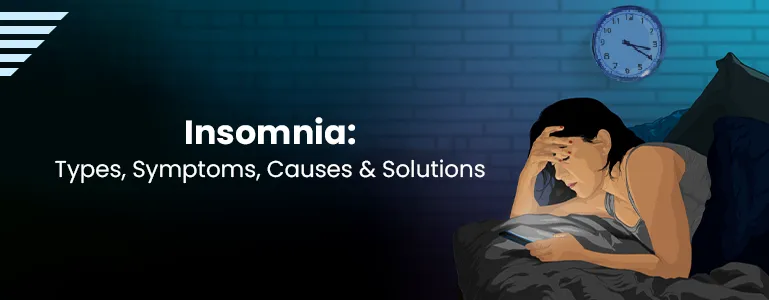Insomnia: Types, Symptoms, Causes, and Solutions

In today's fast-paced world, many of us find ourselves struggling with the relentless grip of insomnia at some point in our lives. Our mood, cognitive performance, and even our physical health can all be negatively impacted by insomnia, which is defined by trouble sleeping or staying asleep. In this blog post, we'll delve into the various types of insomnia, its symptoms, underlying causes, and potential solutions to help you get those precious
Home Sample Collection
Types of Insomnia
Insomnia is not a one-size-fits-all condition; it comes in different forms, each with its own characteristics. The two main types of insomnia are:
Acute Insomnia: This type of insomnia is often short-term and is usually triggered by a specific event or circumstance, such as stress, illness, or changes in the sleep environment. Acute insomnia typically resolves on its own once the underlying cause is addressed.
Chronic Insomnia: When sleep troubles persist for at least three nights a week for three months or longer, it's classified as chronic insomnia. This form of insomnia is more complex and might be related to underlying health issues, lifestyle factors, or psychological conditions.
Symptoms of Insomnia
The symptoms of insomnia go beyond just trouble sleeping. They can manifest both during the night and in daytime functioning. Common symptoms include:
Difficulty falling asleep: Spending a considerable amount of time tossing and turning before finally drifting off.
Waking up during the night: Frequent awakenings and difficulty returning to sleep.
Waking up too early: Rising from sleep earlier than desired and struggling to go back to sleep.
Daytime sleepiness: Feeling tired, fatigued, or sluggish during the day.
Irritability and mood disturbances: Increased irritability, mood swings, and even depression.
Difficulty concentrating: finding it difficult to concentrate on work and remember details.
Impaired performance: Decreased efficiency at work or school due to lack of sleep.
Causes of Insomnia
Understanding the underlying causes of insomnia is essential for finding effective solutions. Some common causes include:
Stress: Everyday worries, workplace pressure, or major life events can keep the mind active, making it difficult to unwind and fall asleep.
Poor Sleep Hygiene: Irregular sleep schedules, excessive screen time before bed, and a disruptive sleep environment can all contribute to insomnia.
Medical Conditions: Chronic pain, respiratory issues like asthma, and neurological conditions can interfere with sleep.
Mental Health Disorders: Conditions such as anxiety, depression, and PTSD are closely linked to insomnia.
Medications: Certain medications like antidepressants, pain relievers, and allergy medications can disrupt sleep patterns.
Substance Abuse: Caffeine, nicotine, and alcohol can negatively impact sleep quality.
Shift Work: Irregular work hours can disrupt the body's natural sleep-wake cycle.
Solutions for Insomnia
Overcoming insomnia requires a comprehensive approach that addresses the root causes and adopts healthy sleep practices. Here are some effective solutions:
Sleep Hygiene: Limit screen time before bed, create a pleasant sleeping environment, and establish a regular sleep pattern.
Stress Management: To alleviate stress and anxiety, try relaxation practices like yoga, meditation, and deep breathing.
Cognitive Behavioral Therapy for Insomnia (CBT-I): This organized therapy assists in identifying and altering unfavorable sleep-related mental patterns and behaviors.
Limit Stimulants: Reduce or eliminate caffeine and nicotine intake, especially close to bedtime.
Physical Activity: Engage in regular exercise, but avoid intense workouts close to bedtime.
Avoid Heavy Meals Before Bed: Large meals can cause discomfort and disrupt sleep.
Mindfulness and Relaxation: Techniques like progressive muscle relaxation can help calm the mind before sleep.
Consult a Professional: If insomnia persists, consult a healthcare provider to rule out any underlying medical or psychological conditions.
Conclusion
Insomnia is a common sleep disorder that can significantly impact our quality of life. By understanding its types, symptoms, and causes, we can take proactive steps to improve our sleep hygiene and overall well-being. Remember, a good night's sleep is not just a luxury; it's a fundamental necessity for a healthy and fulfilling life. If insomnia persists, don't hesitate to seek professional guidance to find the best treatment approach for your specific situation.
Frequently Asked Questions
What is insomnia?
Insomnia is a sleep disorder characterized by difficulty falling asleep, staying asleep, or experiencing non-restorative sleep, leading to daytime functional impairment.
What are the types of insomnia?
There are two main types of insomnia:
Acute Insomnia: Short-term sleep troubles often caused by stress or specific events.
Chronic Insomnia: Persistent sleep problems occurring at least three nights a week for three months or more.
What are the common symptoms of insomnia?
Insomnia symptoms include difficulties falling asleep, numerous nighttime awakenings, waking up too early, daytime lethargy, mood swings, poor performance, and impaired focus.
What causes insomnia?
Insomnia can be caused by various factors, including stress, poor sleep hygiene, medical conditions (pain, asthma), mental health disorders (anxiety, depression), medications, substance abuse, and irregular work schedules.
How does stress contribute to insomnia?
Stress triggers the "fight or flight" reaction in the body, making it challenging to unwind and sleep. Stress-related racing thoughts can keep the mind awake and cause sleeplessness.
What is sleep hygiene, and how does it help with insomnia?
Sleep hygiene refers to adopting healthy sleep practices. Consistent sleep schedules, creating a comfortable sleep environment, limiting screen time before bed, and avoiding heavy meals can improve sleep quality.
What is Cognitive Behavioral Therapy for Insomnia (CBT-I)?
The goal of CBT-I is to alter unfavorable cognitive patterns and sleeping-related behaviors. It aids people in creating better sleeping habits and managing insomnia without resorting to drugs.
Can substances like caffeine and alcohol worsen insomnia?
Yes, caffeine, nicotine, and alcohol can disrupt sleep. Caffeine is a stimulant that interferes with falling asleep, while alcohol might disrupt sleep cycles, leading to fragmented sleep.
How does exercise impact insomnia?
Regular exercise can improve sleep quality. However, intense workouts close to bedtime can have a stimulating effect, making it harder to fall asleep.
When should I seek professional help for insomnia?
If insomnia persists and negatively affects your daily life, it's advisable to consult a healthcare provider. They can help identify underlying causes and recommend appropriate treatments, including therapy or medication if necessary.
Can chronic medical conditions lead to insomnia?
Yes, conditions like chronic pain, asthma, and neurological disorders can cause discomfort that disrupts sleep. Treating the underlying condition can often improve sleep quality.
How important is a comfortable sleep environment?
A comfortable sleep environment promotes relaxation and better sleep. Factors like room temperature, lighting, and mattress quality can significantly impact sleep comfort.
Are there any natural remedies for insomnia?
Some natural remedies include practicing relaxation techniques (deep breathing, meditation), using aromatherapy, and consuming sleep-promoting herbal teas like chamomile.
Can changing my diet help with insomnia?
While there's no specific "insomnia diet," avoiding heavy meals before bed and limiting caffeine and sugar intake in the evening can support better sleep.
How long does it take to see improvements with insomnia treatments?
The timeline for improvement varies. Simple sleep hygiene changes might show immediate results, while therapies like CBT-I could take a few weeks to yield noticeable improvements.
Book Your Slot
Our Locations Near You in Hyderabad
3KM from Banjara Hills
1.9KM from Yusufguda
3KM from Madhura Nagar
5KM from Shaikpet
Profiles
- Cardiac Risk Profile
- Pituitary marker Profile
- Rheumatoid Arthritis Profile
- Dengue Fever Panel
- Lung Cancer Panel 1 Complete Molecular
- Gastroenteritis Screening Panel
- Thyroid Profile (T3,T4,TSH), Serum
- Pancreatic Marker Profile
- STD profile
- Androgen Profile
- Lipid Profile, Serum
- Pancreatic(acute)Profile
- PCOD Profile
Radiology
Pathology Tests
- Glucose Fasting (FBS),Sodium Fluoride Plasma
- Creatinine, Serum
- Glycosylated Hemoglobin (HbA1C)
- Vitamin B12 (Cyanocobalamin), Serum
- Thyroid Stimulating Hormone (TSH) Ultrasensitive, Serum
- Complete Urine Examination (CUE), Urine
- Liver Function Test (LFT),Serum
- Dengue (IgG & IgM), Serum
- Dengue Antigen (Ns1) Rapid, Serum
- C-Reactive Protein (CRP), Serum
- Widal (Slide Method), Serum
- Total IgE, Serum




